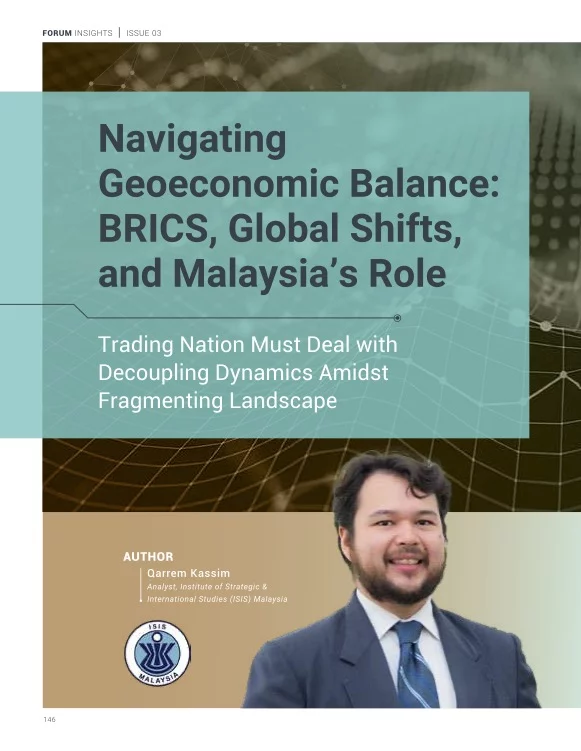Navigating geoeconomic balance: BRICS, global shifts, and Malaysia’s role
Trading nation must deal with decoupling dynamics amidst fragmenting landscape
Author: Qarrem Kassim
Scepticism about globalisation has increased. The US-Sino economic rivalry, Covid-19 pandemic, conflict in the Ukraine and the recent escalation of tensions in the Middle East have placed pressure on globalisation, upending the long-term trend of universal economic integration. Current trends point to a gradual fragmentation of a highly integrated financial and economic system with major power blocs seeking to decouple dependence from one another.
Global cooperation is slowly realigning; major economies are adopting a policy of strategic autonomy aimed at reducing economic dependency in various key sectors, which could potentially lead to geoeconomic fragmentation and zero-sum reasoning. Recent moves, such as the scrutiny over Chinese investments and trade in strategic sectors by US and EU authorities, serve as an important reminder that the strategic rebalancing of global trade remains an ongoing geoeconomic agenda. Moreover, such strategies encourage countries on the global periphery – such as Malaysia – to machinate their own brand of geoeconomic hedging, exercising caution, and examining the shadows of great powers.
Geopolitical tensions often imply adverse consequences for macro-financial stability. The imposition of financial restrictions, increased policy uncertainty and heightened risk aversion associated with these could exacerbate decoupling. Such policies might cause investors to reallocate their portfolios and reconsider credit lines along geopolitical fault lines, leading to unpredictable capital flows and declines in asset valuations. A fragmented geoeconomic landscape along geopolitical allegiances could, therefore, make the world more vulnerable to adverse shocks amid insufficient risk diversifications.
Against this backdrop of geoeconomic fragmentation, strategic realignments have emerged, including one in which the Global South could widen its influence in the world’s financial architecture. Groupings like BRICS, a loose alignment of Global South nations, have stated their intent to explore new mechanisms to diversify traditional cross-border settlement systems, despite substantial challenges. Increasing discussion of cross-currency trade to strategically leverage against the dollar-dominated system in global finance is still in its early stages and has emerged somewhat in reaction to an increasingly weaponised dollar against geopolitical “threats” and “rivals.”
Notably, the future entry of trade-friendly, middle-income states like Malaysia and Thailand into BRICS might create further momentum for a more diversified global financial architecture. While long-held reliance on the traditional dollar-based trade system is unlikely to be upended any time soon, due to the entrenched role of traditional financial systems and institutions, new possibilities are emerging that could refocus the global economic and financial balance towards the Global South.





